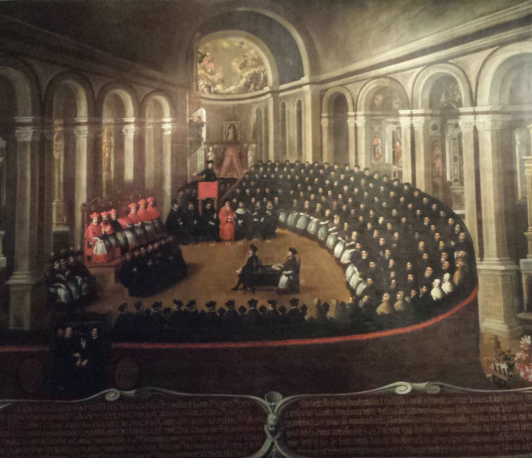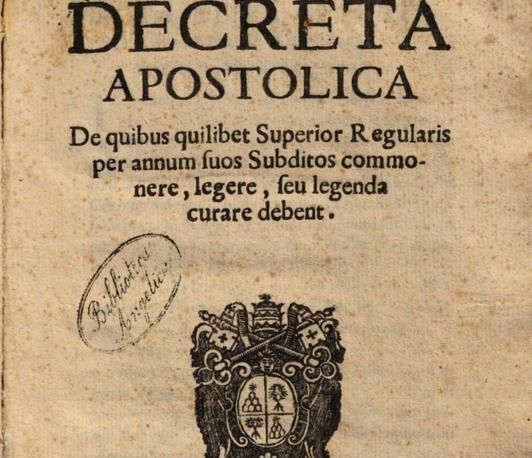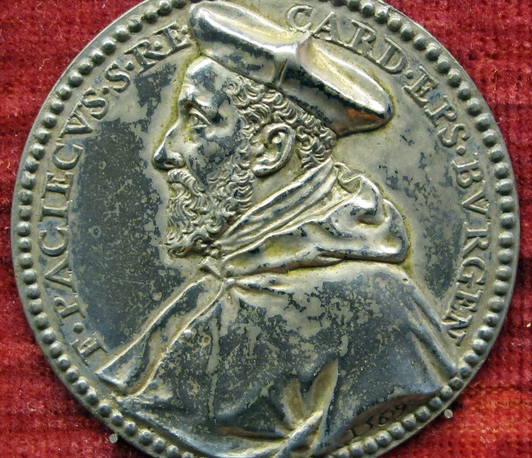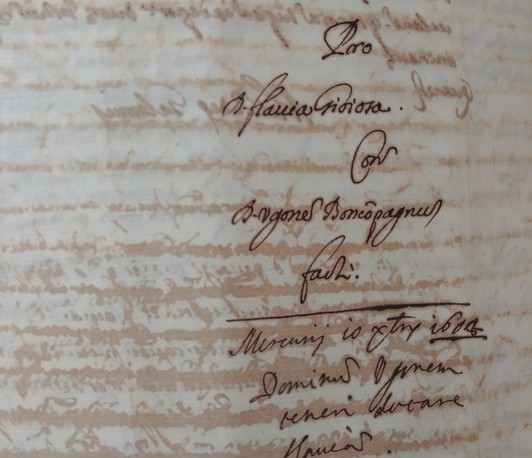Normative production and decision-making processes in the Roman Curia (16th-20th centuries)
Lecture Series
Presentation
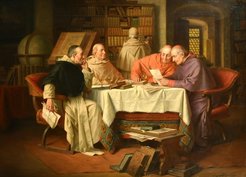
The Roman Curia can be regarded as an institution at the crossroads of multiple processes of translation of canon law. This applies in particular after the experiences made with the Avignon papacy and, even more so, with the emergence of the ius novissimum after the Council of Trent. In other words, the Curia became an important player in the game of interpreting and adapting norms to realities, its position constantly shifting between universal and local perspectives. Thus, it is no exaggeration to state that, at the dawn of modern times, the Roman Curia rose as a dynamic laboratory for the production of normative knowledge. However, there are several factors that have not favoured the development of wide-ranging analyses: the non-linearity of curial structures and mechanisms, the well-known complexity of its archives and sources, and the trends of international research on the history of the papacy, which have traditionally promoted mostly national approaches – have not, however, favoured the development of wide-ranging analyses. Moreover, studies on the Roman Curia have often focused on individual dicasteries, neglecting a more thematic and diachronic approach. This lecture series, which takes place in 2023 and 2024 at our Institute, moves beyond these limits, offering a space for cross-disciplinary discussions on the normative production and the decision-making processes unfolded in curial context. Each session opens with the contribution of an international expert on the history of the papacy and the Roman Curia, legal history, canon law and/or theology. These contributions are expected to connect the richness of a particular research experience with a larger common theme, thus favouring comparison and further debate.
To watch the video recordings of the lectures follow the research group's youtube channel.
Events
Among the common themes, the following will be addressed
1. The Roman Curia's role in the governance of the Church and the practice of law
The Roman Curia is an institution in charge of Church governance and, as such, brings forward legal practices that are peculiar to the Church’s unique structure. Exploring the intersection between government and law, this theme entails reflections on: the traits that the Roman Curia has in common with other government systems, as well as the characteristics that make it stand out; the types of legal procedure that unfold within curial organs; the ways that dicasteries approach different legal realms (e.g. universal canon law, local and particular rights, privileges and exemptions, civil law etc.) and normativities (e.g. legal norms, moral theology); the predominant normative references (e.g. the Council of Trent) and authorities (e.g. the pope, legal doctrine); the relational dynamics among dicasteries considering the overlaps of competence and the sharing of normative references.
2. Decision-making processes and legal techniques
A primary governance task of the Roman Curia is to provide authoritative answers in specific cases. In a word: to decide. This theme focuses on the processes and techniques employed by the dicasteries to reach a decision. Following the insight that governing the Church implies the coexistence of multiple levels of decision-making, different approaches are encouraged: analysing the procedural development of a specific dicastery as well as of the Roman Curia as a whole; assessing of the impact of general and particular reforms; combining perspectives internal and external to the Holy See (with the inclusion, for example, of local jurisdictions, civil courts), among others. This theme also entails reflections on a more technical level, regarding, for instance, the relationship between competence and procedure, as well as the adjustment of decision-making techniques (analogy, chains of precedents, authentic interpretation etc.) to the specificity of canon law and the needs of ecclesiastical governance. Finally, the variety of administrative, judicial and chancery practices that the Roman Curia presents begs the question of systematisation: to which extent is it possible to observe procedural patterns?
3. The actors
Institutions as such cannot carry out any work – for this, they depend on concrete actors. This theme focuses on the persons involved in the production of normative knowledge in the Roman Curia, considering singular dicasteries as well as cross-cutting perspectives (the pope as a transversal actor, for instance). Particular attention is given to how administrative functions – such as those of prefects, secretaries, cardinal-members, consultants etc. – changed over time, with or without explicit reforms. Another topic of interest is personal influence: what was the impact of friendship and political alliance, within and beyond the Roman Curia, on decision-making processes? What was the role of influential figures, like cardinal protectors, procurators, and lawyers?
4. The normative production of the Roman Curia and its translations
How can the normative production of the Roman Curia be defined? There is no doubt that when the dicasteries issue decisions they are producing normative documents. Yet the subject has far more nuance than it may seem. First of all, normative documents can assume very different forms (rescripts, decrees, circular letters, bulls, briefs etc.), which represents a true challenge from the perspective of diplomatics. Besides that, throughout the centuries, curial decisions have been the object of heated debate with regard to their legal value – a controversy that paves the way for reflection on other types of normative weight (political, social, cultural, etc.). Moreover, the production of norms implies the production of normative forms of organisation and diffusion of these norms; in the case of the Roman Curia, the analysis of this dimension is still a work in progress, as it entails addressing the complex structure of its archives, voluminous compilations of curial decisions, and many serial publications (journals, bulletins). All these aspects are comprised in this theme. And more – such as the impact of non-legal practices on normative production as well as the strategies of translation of norms to specific realities, via exchanges between the Roman Curia and local entities.
This being said, the lecture series also covers topics, institutions and actors that, though not exclusively connected to the Roman Curia, broaden our understanding of its operative context. That is the case of decision-making mechanisms in ecumenical and local councils.
Finally, the guests speakers and organisers will pay special attention to the history of the historiography of the Roman Curia, its many authors and complex dynamics, in order to foster a dialogue that goes beyond specific themes and case studies, moving on to the terrain of interdisciplinarity.
The lecture series is open to everyone interested in these topics, whether you already have research experience on curial organs or whether you have complementary scientific interests. We hope that the meetings will provide a forum for open discussion of recent or ongoing research. Each lecture is followed by a question and answer session and a debate in which all participants, present in Frankfurt or online, are warmly invited to share their views.
For information on the scientific conception of the lecture series, feel free to contact Benedetta Albani: albani@lhlt.mpg.de.
Organising information and contacts
All sessions are held in English and take place in hybrid format, in person at the Institute's premises and online. Participants may register here, specifying their mode of participation.
For information on the organisation of the lecture series, feel free to contact Francesco Giuliani: giuliani@lhlt.mpg.de.

